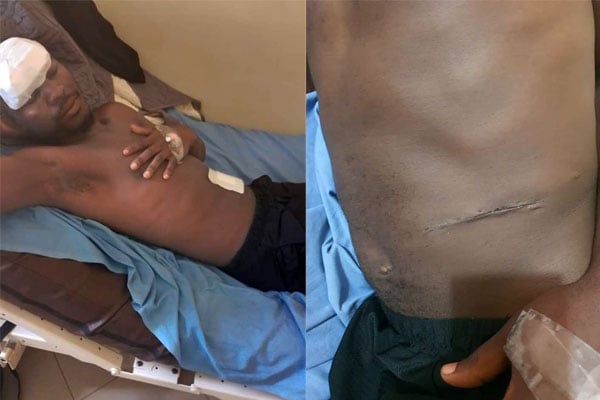Prime
Was Kabanda victim of illegal kidney harvest?

Mr Muhammad Kabanda says his left kidney was removed without his consent at Old Kampala Hospital. Photo / File
What you need to know:
- Some health experts have said there is a possibility that Mr Muhammad Kabanda was born without a kidney. That possibility works out to one in 2,000 births as per a book authored by Dr Robert M Kliegman, an American specialist.
The allegations that a doctor at Old Kampala Hospital harvested the kidney of a petty trader in Kampala have revived a debate on organ donation in the country.
Some health experts have said there is a possibility that Mr Muhammad Kabanda was born without a kidney. That possibility works out to one in 2,000 births as per a book authored by Dr Robert M Kliegman, an American specialist.
Prof Joel Okullo, the chairperson of the Uganda Medical and Dental Practitioners Council, told Sunday Monitor on Friday that “the file of the patient” was collected and it will be examined to inform “the next steps.”
Mr Kabanda said he visited Old Kampala Hospital on September 24, following a boda boda accident on Lukuli Road in Kampala. The hospital confirmed receiving and handling Mr Kabanda who had sustained severe head injuries.
Mr Kabanda, who is seeking compensation from the facility, said he was asked to pay Shs3.35m for the head operation and an additional Shs2m for medication.
“But when the operation was done I was shocked to discover that I had a fresh incision on the left-hand side of my abdomen, which could not be satisfactorily explained by the doctors at the facility or their management,” he said.
He added: “I went and did two ultrasound scans—one at Malcom [hospital] and the second one at Mulago National Referral Hospital … the reports of radiologists confirmed that my left kidney had been extracted. A CT Scan was also conducted at Mengo Hospital and posted the same results,” he said.
How possible is it that Mr Kabanda was born with one kidney?
In his book, Dr Kliegman reveals that the incidence of the condition known as “unilateral renal agenesis (URA) is one in 2,000 births and is more frequent in males and on the left side.”
Scan results that this reporter saw indicate that Mr Kabanda has no left kidney. Prof Okullo said they will verify all the documents and come up with a ruling.
Dr Simon Peter Eyoku, a kidney specialist who heads the Kidney Unit of Mulago hospital, told Sunday Monitor a person can be born with one kidney and “scans … can be done to determine this.”
In June, the family of a mother, who accused medics at Mubende Regional Referral Hospital of extracting her kidney, dismissed a report by the State House Health Monitoring Unit (SHHMT), which indicated that she was born with one kidney. But the SHHMT said then that an abdominal CT scan done by radiologist Sharif Kikomeko of Mulago hospital revealed that there was “no kidney tissue on the right renal bed and an enlarged left kidney.”
So is it possible that Mr Kabanda’s kidney was illicitly harvested?
Dr Frank Asiimwe, a transplant surgeon at Mulago hospital, said this is unlikely because Uganda lacks capacity.
Dr Asiimwe said even after harvesting the kidney, the transplant should be done between 30 minutes to one hour for the kidney to work well.
“We have no skill to remove a kidney in Mengo. The doctor in question is a neurosurgeon who has no business [skills] in removing kidneys. You have to understand the difference between the organ for transplant and the organ for ritual purposes,” he said.
Dr Asiimwe said: “If it is true that someone removed the kidney illegally, the punishment is life imprisonment, according to the Uganda Human Organ Donation and Transplant Act. But that must be proved.”
Could the organ have been removed for ritual purposes then?
Again, Dr Asiimwe reckons this is unlikely.
“There is a huge difference. The organ for rituals can be retrieved from a dead person and you run away, but for an organ for transplant you need to test the donor and recipient for viability because there is someone paying a lot of money for the medical procedure,” he said.
The procedures for a kidney transplant can cost anywhere between $100,000 (Shs380m) and $143,500 (Shs546m) as per figures on the Internet.
“So, the organ must be picked from the right theatre, by the right person and done in the right way. In a proper organ transplant, you even have to cut one of the ribs for easy access,” Dr Asiimwe revealed, adding, “One needs to open and they are looking in and observing. It is a delicate process.”
So is a transplant in neighbouring countries out of the question?
Kidney transplants are done in Kenya, signalling a possibility that some people may rush with the harvested organ to our eastern neighbour. Sources also told Sunday Monitor that it is also possible there could be some superior ways of preserving the organs so they can be transported to the right facilities.
Dr Asiimwe, however, begs to differ.
“The kidney should also be transplanted in one hour for the best outcome, but in the centre where I trained it is done in 30 minutes. Immediately after removal from the body, the organ starts deteriorating even if you preserve it,” he said.
He added: “The theatres have to be close to each other for the best outcome and the donor and recipient should be opened around the same time. It is also done by a chain of doctors.”
Is Mr Kabanda’s case an outlier?
This is not the first time Ugandans are hearing about a missing kidney or illegal removal of human organs. Some people who went to the Middle East have also complained that their kidneys were harvested. The Middle East has facilities to do the transplant.
What does the Ugandan law say about organ transplants?
According to the provisions in the Uganda Human Organ Donation and Transplant Act, the kidney should be donated (given freely) like blood. There should be no sale of human organs. The Act also seeks to designate Mulago hospital as the only transplant centre, which will be governed by a board.
The designated facility, according to the Act, should account for every transplant (source of the organ and selection of the recipient). Any violation will lead to the cancellation of the licence to carry out transplantation and implicated medics will be punished and their practising licence cancelled.
The Act expressly states that “the sale of one of a pair of organs such as eye or kidney by a living donor for financial or any other form of compensation is prohibited.”
It adds that living donors may only be compensated for loss of earnings and any other justifiable expenses caused by removal or by related medical examination. Payment is also acceptable for technical services related to organ removal in a regulated setting.
In the Act, any person who gives or receives a reward for the supply of, or for an offer to supply a human organ, cell or tissue is also liable, upon conviction, to a fine not exceeding one hundred thousand currency points (Shs2 billion) or 20 years in prison. This penalty also applies to brokers, hospitals and companies found culpable. The removal of any organ from the dead body by hospitals without consent from a close relative is also prohibited.
Black market
Although Uganda seeks to shield itself from the illegal trade in human organs, an Internet search indicates that people are selling organs on the black market. In India, people sell organs such as a kidney at $20,000 (Shs76m). In China, buyers will pay $40,000 (Shs152m) or more. While in Israel, a good and healthy kidney goes for $160,000 (Shs608m).




